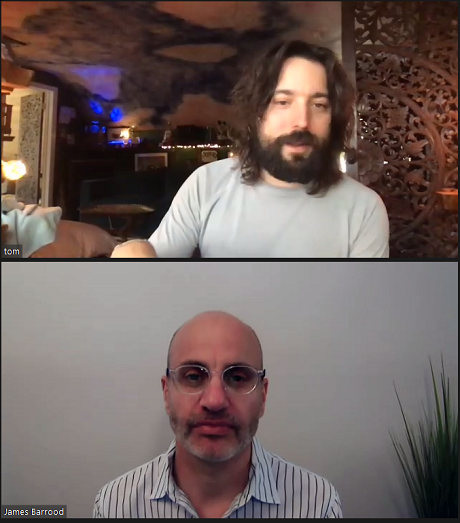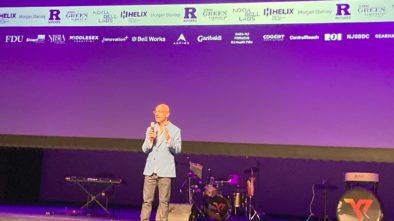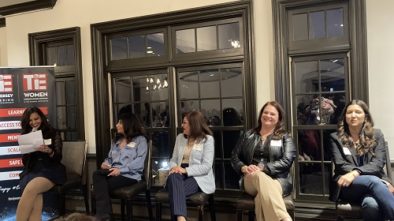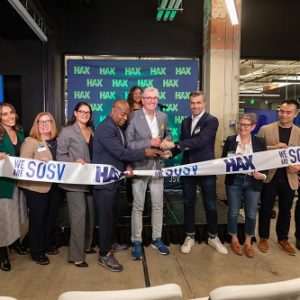TerraCycle’s Szaky Gives Advice to Mission-Driven Companies During Chat
In October Tom Szaky, founder and CEO of TerraCycle, was interviewed by James Barrood, former head of the NJ Tech Council (now TechUnited:NJ) and an adviser to Tech Council Ventures (Summit).
TerraCycle is a Trenton-based company that is disrupting waste management via its business model and technology. The company has been in business since 2003. It is a global enterprise that has three independent divisions, all of them addressing recycling issues.
The first division channels what Szaky calls “nonlinear products,” which are products that are normally thrown away — like diapers, cigarette butts and toothpaste tubes — into a circular system. “We collect things and make sure they can be recycled at scale.” The company runs recycling waste streams for thousands of items all over the world, he said. For example, cigarette butts are collected, recycled and made into park benches.
The second division answers the question, “How do we integrate waste back into products?” Allowing products to be made from some recycled materials lowers the risk of attracting new materials he said.
Less than two years ago, TerraCycle took things one step further by creating its third division, Loop, a company that harkens back to the 1950s, when people drank milk from refillable bottles, Szaky said. Loop focuses on eliminating disposability. According to a company press release, “Loop enables consumers to shop for products in durable packaging that is used, cleaned, refilled and used again, and then fully recyclable after 20 to 100 uses. It enables brands to develop more valuable and distinctive products and packaging and provides consumers with more beautiful, functional and “milk-man model” deposit/return packaging. To date, Loop has enlisted over 100 brands globally and offers over approximately 400 products.”
TerraCycle recently announced that it had completed a Series A capital raise of $25 million for Loop. According to the company, investors included: P&G (Cincinnati), Nestlé (Vevey, Switzerland), SUEZ (Paramus), Aptar (Eatontown), Sky Ocean Ventures (San Francisco), ImpactAssets (Bethesda, Md.) and Quadia (Geneva, Switzerland).
Advice to Mission-Driven Company Founders
While Szaky spent a lot of time during the chat describing what TerraCycle does, he also answered the online audience members’ questions about his entrepreneurial journey and how to succeed when you run a company with a double bottom line — one based on profits and the other based on the company’s mission.
Said Szaky, “I faced all the normal trappings that you would have in a normal entrepreneurial journey. What I would say is the incremental unique piece is how to grapple with the idea of being a purpose-driven, for-profit organization.”
That is a double-edged sword, he said. Its beneficial purpose is incredibly powerful. “It allows us to attract team members that are incredibly talented, not just on sheer cash compensation. It opens doors for us with partners that normally wouldn’t be open. It allows us to be attractive to the media. And TerraCycle’s been written about. On average, there are about 40 articles a day every day about this organization. And there are so many other positives,” he said.
“But you also have to steward purpose. You may have to edit what you may do. And it’s important that you claim it. … So, that’s the real thing that I learned along the way.
“I’ll give you an example. When we first started to recycle, and invented something like diaper recycling, we said, ‘Isn’t this amazing? Diapers make up 3 percent of landfills. Let’s go out to all the diaper companies. I’m thinking, ‘Aren’t they going to be so excited that we can offer them the ability to solve that very important issue.’” However, Szaky noted, “We would get maybe a little bit of programming or something like that, but nothing with real scale, like how we are moving now on diaper recycling.
“And we realized that if we lead with purpose” when selling to an enterprise, “we’re going to get in the front door, maybe we’ll get a little something, but it’s not the right way to do this. This is a huge issue in sustainable business overall. We say the purpose is the reason [for a customer company] to do something,” he explained.
“And so, a client would say to us, ‘We’re going to do your program because it’s the right thing to do.’ Now, the lesson I learned is that when someone says that to you, especially if you’re running a mission-driven organization, that’s actually code for: I’ll do it for the moral imperative, but there’s no other reason I can justify doing this. It’s not going to show up on my P&L [profit and loss statement]. It’s not going to make the company money, more profitable or larger. It’s just the moral imperative.”
Reframe Your Sales Arguments
What sustainability-oriented companies need to do is reframe the argument and empathize with the customer. “Take diaper recycling, for example. Think about what you know, and empathize with what the diaper companies really want to do. They want to increase their market share, they want to have you buy their brand of diapers, and not someone else’s. They aren’t going to have people actually buy more diapers, because people just buy the diapers they need. But you may buy brand A versus brand Y. And when we framed diaper recycling like this, and showed how it can drive market share in a really authentic way, then companies started leaning in.”
Szaky noted that as soon as his company realized this pathway, it began to sign larger, more substantial deals. “That’s how we were able to launch recycling with Pampers in Holland. And now it’s expanding around the world. And that is the critical lesson I’ve learned in purposeful businesses. You have to convince somebody in business. The customer, the consumer, someone always has to be convinced to give you money for your product or your service. It’s a truism in business. Purpose opens up a lot of things, and it’s amazing, but don’t make that the reason someone should do something,” he said.
“A good example of this is organic food. The people who created the organic food movement did it to help the birds and the butterflies and the bees. I mean it was for better regenerative farming. But if you ask consumers, the number one reason they buy organic food today, it’s entirely because that it’s better for your personal human health. It’s not about the birds and the butterflies and the bees. So, it’s important to accept that and play into that, and understand that’s how these sort of chess pieces move on the chessboard. And that’s been a great lesson for me in starting and scaling a mission-driven organization.”
Watch the video of Barrood’s interview with Szaky here.




